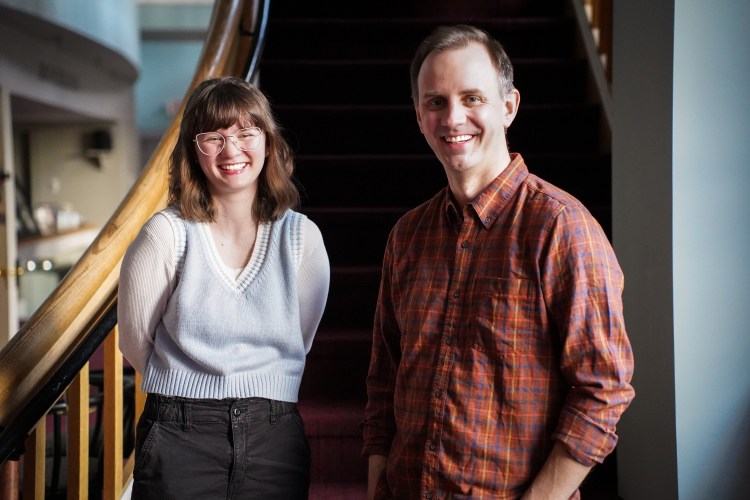Production for A Christmas Carol is in full swing at Portland Stage as they prepare to stage Charles Dickens’s immortal 1843 work for the 23rd time. But the show is more than a seasonal tradition: many young performers in the ensemble are a part of Portland Stage Education, which includes year-round programming for young people from preschool through high school. Longtime fans of the production will be pleased to know Tom Ford (Member, AEA) is reprising the role of Scrooge, which he last performed in 2003, and Caley Milliken (Member, AEA) returns for a third time to perform the roles of all three Ghosts.
Michael Dix Thomas is the director of the Education Program. He is also directing this year’s production of A Christmas Carol. Paige Scala played Tiny Tim alongside his Bob Cratchit in 2016, and now as a high school senior, they will play multiple roles in the ensemble. Thomas and Scala joined a conversation a week into rehearsal.
This interview has been edited and condensed for clarity.
Adams: Mike, since you grew up in Maine, did theater as a young person, and have worked with Portland Stage professionally, directing the Education Program must be a really fulfilling role.
Thomas: Before going to graduate school in D.C., I worked with the Education Program, doing things like Play Me a Story, our Saturday morning program for ages four to 10, and the Director’s Lab, which does school tours of Shakespeare. I moved back in 2020, and I’ve been in this role for a little over a year now. It has been lovely to work on a mainstage project that has so much connection to our education programs. Many of the young folks in this show have been involved in camps, classes, and programs with us in other capacities.

Michael Dix Thomas (Bob Cratchit) carries Paige Scala (Tiny Tim) on his shoulder during the 2016 production of “A Christmas Carol.”
Paige, why did you audition in 2016? What keeps you coming back to the theater?
Scala: I think it was just getting out and doing things that aren’t sitting in a classroom for six hours a day, coming home, eating dinner, and then doing it again the next day. It was the first time I had done something like that and being in fifth grade but set loose in rehearsal, I felt a little bit of independence. And I remember it was so cool seeing my friends in the audience.
And how have you grown as an actor and person over the years?
Scala: A question that’s asked in theater a lot is “why are you doing this?” or “what’s your motivation?” When I first got into it, I would just be myself, say the lines, react like I would react. But now, I think about the character. How would they react? You are learning to work with other people in a practical, professional sense, but also learning to step outside yourself and really try on a different perspective.
This is a big question, but Mike, you have an MFA in Classical Acting, so why do you think this is such a timeless story?
Thomas: I’ve always imagined Scrooge as like, a faceless evil who needs to be changed. For whatever reason, he’s closed himself off from the world and the play is the process of him opening back up. And so, we often interpret that to mean that there are a handful of very bad capitalists and if we can just get them to change, the world will be better.
Now, when Dickens visited the States in 1842, he hated much of what he saw, but connected with Universalism, an offshoot of Protestantism that sees the inherent dignity and worth of each human, and all paths to the Holy as valid. So, for me now—and thank you to literary manager Todd Brian Backus for helping me articulate this—I think the play is asking us to find that closed off part within ourselves, the Scrooge in each of us. I want the audience to see that and ask, where are the places that we have shut off the world? How can we invite other people in, and become warmer, more open, more involved in our community and society? It’s been a real change for me to start to see it through that lens.
Visit portlandstage.org/education to learn more about classes, camps, student matinees, and touring programs for children in grades pre-K to 12.

Comments are not available on this story.
Send questions/comments to the editors.


